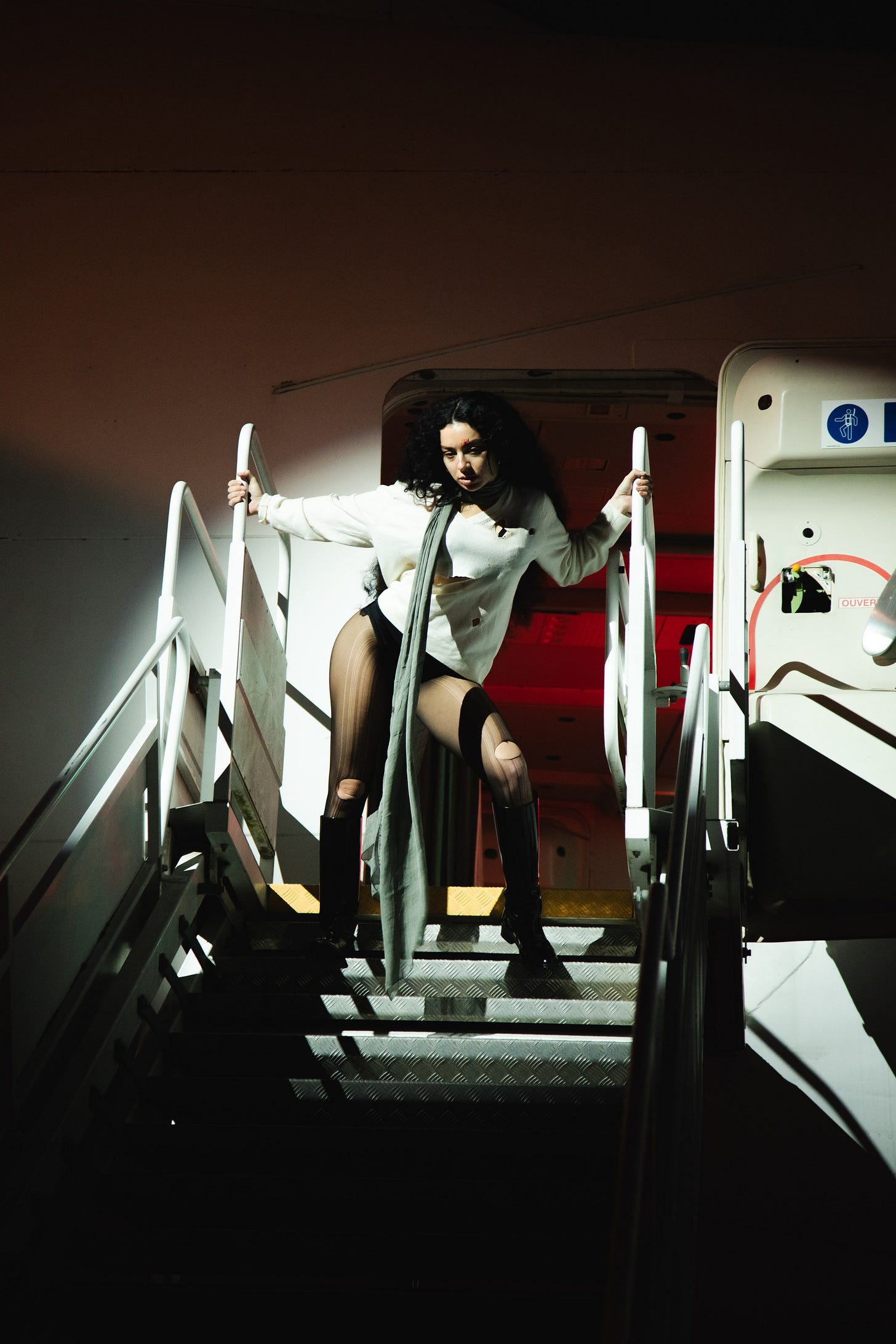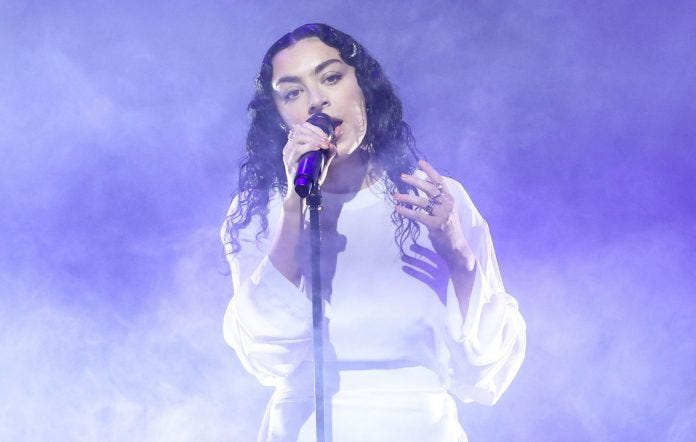Now that we’re in the dead center of “Brat Summer” - a hitherto unrivaled season of the year created by ravegirl-popstar Charli XCX - it’s clear that the artist’s new album BRAT is something special, something that will last.
In the month since the album came out, every queer club in Los Angeles has found itself taken over by BRAT, its songs and hooks on constant repeat, sometimes played direct from the album and other times barely recognizable, emerging like a memory from some noisy thrash-house track, the siren call of “bumpin’ that” sending the crowd wild. The denizens of these crowds have jumped onto the “Brat Summer” trend, embodying its blend of messiness and arrogance. It’s all about becoming the “cool girl” that acts like she’s the center of the party, even if tears have sent mascara running down her face. Snarky, insecure, forever partying; a character best personified by the artist herself.
In the 15 years since first emerging onto the pop scene, Charli XCX has torn through styles and movements. After emerging from the underground rave scene of East London, the artist bounced between the mainstream pop world and its underground variants, initially finding underground fame through collaborations with the PC Music collective. With 2022’s sleek, mid-tempo Crash (her “‘major label sell-out’ record”, in her words1) Charli shot to Number One on the charts. The artist, though, has veered away from mainstream fame, hitting rewind and returning to the warehouses she was DJing at when she was fourteen, recreating these sweaty, underground spaces while pushing their sound forward.
From the bathroom to the decks to the dance floor, the club is where Charli has set her new album, the stage where the Brat comes alive; her volcanic, now-mythologized Boiler Room set shows she is as (if not more) comfortable as a DJ than a pop diva. It’s a home to her, a place where every emotion can be aired out, explored, and thrown away, night after night after night. BRAT’s blend of the hypnotic, pulsing sound of these spaces and vulnerable, no-nonsense lyrics makes it a stunningly realized and singular party album, a record that is made by and for the spaces she has returned to her whole life. Her muse is the club, and their relationship has yielded her best album yet.
From the beginning of the BRAT rollout, Charli and co. began to mold the world of the Brat; “music is not important…a great artist to me is more than the songs, it’s the entire culture and space that they inhabit”, Charli argues2. In the video for second single “360”, Charli perfectly crystalizes this culture by surrounding herself with a who’s-who of, as the video says, “hot internet girls”.
The painful skit that leads up to the song (featuring Rachel Sennott, Chloe Cherry, Julia Fox, etc.) is one of the few elements of the album that seems engineered to get the most clicks (the same can be said for the hackneyed, pandering “Mean girls”). It’s a shame how much it takes away from the song itself, a cute and sprightly flex that introduces us to the titular protagonist, a girl who relentlessly reminds us how much we love her, how much we need her, until she’s practically gripping us by the collar, repeating herself ad nauseum with boozy breath, every word making it clearer and clearer how little she believes in what she’s saying.
The rest of the album is much less grating, mostly because it focuses on Charli and Charli alone, particularly her bratty struggle against the pop industry. “Brattiness is a cloak”, she says; “you’re only a brat if you’re acting out against something that’s made you feel a little bit insecure.”3 The album works so damn well as a vulnerable club manifesto not despite the relentlessness of the boasts, but because of them; the production (and the album as a whole) is defined by loops and hooks, by minimalist sound design and diaristic, off-the-cuff lyrics.
“Von dutch”, the first single from the album, is built around shifting, pounding pulses of sound, a kick-your-ass-to-the-curb soundtrack to more of Charli’s boasting, an endless loop of “I’m your number one”, the increasingly desperate affirmation of someone whose anxiety about her tenuous position as someone who’s “famous but not quite” has reached a fever pitch, evidenced by the surprisingly affecting “I might say something stupid”. It’s a lament from maybe the last true party girl in the pop industry, a Britney who actually has the ability to speak her mind and make the music she wants to make.
And the knee jerk reaction to all of this soul-bearing is why should we care? Why do people go up in arms about billionaires like Taylor Swift not having control of her catalog, or the plights of any celebrity who couldn’t be bothered to make a stand on anything remotely political? It’s easy to write this off as another rich celebrity bemoaning their life of partying, wealth, and popularity. But it’s hard to deny that BRAT feels different.
Explaining the video for “Von dutch”, Charli breaks its celebrity-on-the-run concept down to the idea of “You know how sometimes you just feel like someone’s watching your every move? This song is me saying, ‘well, if you want to watch, I’m going to give you a show’”4. Social media, fashion trends, mirrors all around us - all of it makes up the panopticon of modern life. We do feel like we’re being watched all the time, so it makes sense that we feel a connection with someone who literally is.
Charli never leaves the spotlight of the album, her thoughts and feelings never taking the backseat to copious features, as on Pop 2 or Crash. She boldly proclaimed that the album is “not collaborative. It’s not me playing a character. It’s direct and honest”5; though she may emphasize her own personal stakes and control over the album, she by no means tries to pass it off as the work of an auteur.
On “club classics”, she, of course, says she wants to dance to “me, me, me”, but also directly shouts out many of the collaborators with a steely-voiced clarity: “I wanna dance to A. G./I wanna dance with George/I wanna dance to SOPHIE/I wanna dance to HudMo”. The track itself is the responsibility of A.G. Cook and George Daniel, who collectively produced 12 of the album’s 15 tracks. Cook has been Charli’s executive producer since 2017, and, with this album, they’ve found a sound that fuses his future-focused hyperpop sound with her popstar vision (by the way, go listen to Britpop).
Another collaborator looms large over the album: the spirit of the late SOPHIE lives in all of its minimalist, warping songs, and Charli directly addresses this ghost in “So I”: “Your sounds, your words live on, endless/When I make songs, I remember/Things you'd suggest, ‘Make it faster’”. It ranks alongside the most vulnerable and truthful on the album, a no-frills apology and self-criticism that centers both Charli and her friend.
It’s a shame, though, that the song doesn’t abide by SOPHIE’s advice literally cited in the song; Vince Staples iconically reflected on working with the late producer by saying “don’t let the verse be deep or heartfelt cause she stopping the computer and walking outside until you get bacc on some gangsta shit”6. The song is understated and sweet, but it doesn’t explore the sonic terrain that made SOPHIE the legend she’s rightfully become.
Charli premiered the song at the 2024 Billboard Women in Music Awards, whose central concept has provoked ambivalence in her, because, in past years, “feminism became a popular marketing tool. In the music industry, it was distilled into this idea that…if you’re not a girl’s girl then you’re a bad woman”7. On Brat, Charli turns girlhood over and around in her hand, looking at all its different facets that, as “Girl, so confusing” says right in the title, make it a heavy burden to dance around with. The Lorde-inspired song comes a bit after “Sympathy is a knife”, whose javelin-esqe synths jab around her shockingly (and refreshingly) raw lyrics; her genuinely agonized questions (“Why I wanna buy a gun/Why I wanna shoot myself?”) are still a jolt no matter how many times one listens to it.
“Relationships between women are super-complex and multi-layered. You can like someone and dislike them at the same time; you can feel jealous of somebody but they can still be your friend”8. BRAT proposes that, no, it’s not “unprogressive” to feel emotions like jealousy or insecurity towards other women - it’s human, it’s natural, and it’s confusing as hell.
These jumbled up feelings of envy and friendship later become a tool for self-reflection, a way for Charli to unpack her place in the world. Her recent admission that, regarding motherhood, she “[feels] like a kid; I don’t feel like I can make that decision”9 comes to life in the penultimate track, “I think about it all the time”, an ode to her friends who’ve now become mothers, and a question about if she can do the same. It’s a remarkable act of vulnerability for her and George Daniel, her fiancé and co-producer for much of the album. Their relationship is further explored in “Talk talk”, a gem that rediscovers the euphoria of trance, PC Music, and mid-2010s pop. It’s a cute, sexy love letter to someone who seems to have rescued her from the on-off situationships renounced in “B2b”.
When George comes up in these songs, the Brat persona melts away, and Charli muses about travel, about escaping from the head-spinning repetition of clubs and the perils of being a 21st century It Girl. “Everything is romantic”, like a K-hole “Waters of March”, is a list of sights and moments that crystalizes Charli’s attempts throughout the album to avoid overly metaphoric pop songwriting and find inspiration from texts and quick shouts over club music. It’s a pop star's downtime between tour stops, brief moments of reflection turned into pics sent to friends across the world, or to parents, whom Charli runs from and comes back to in the bouncy, candy coated “Apple”, by far the most overlooked track on the album.
She’s a partygirl who can’t stop thinking about family, whether it’s the one she has or the one she might make, and these brief glimpses of her life only deepen the complexities of what it means to be a “brat”, and if there’s a future outside of that life.
But, whether it’s a DJ starting a track over again or a club kid returning, sunglasses on, to the venue where they swore they’d never return to after blacking out the week before, history repeats itself. In “365”, the album’s face-melting grand finale, we loop back to the beginning, back to theme song “360”, which has now devolved into a woozy and explosive night out, its central hook of “bumpin’ that” now an explicit call for drugs, for more music, for anything to keep the night going. It careens between different musical styles, Cook and Charli gleefully indulging in the old adage that too much of a good thing can be the greatest thing in the world. No more introspection, no more romance, no kids, no fucks given, no competition or envy. Just the party, just more, more, more. This is a song SOPHIE would be proud of.
This is the song that shows that Charli, six albums in, is just getting started. And she “doesn’t fucking care what you think”. Maybe.
https://www.bbc.com/news/entertainment-arts-62690604
https://www.gq-magazine.co.uk/article/charli-xcx-interview-2024
https://www.rollingstone.co.uk/music/features/charli-xcx-interview-brat-music-39628/
https://vogue.sg/charli-xcx-cover-story/
https://www.billboard.com/music/awards/charli-xcx-women-in-music-powerhouse-brat-new-album-1235619161/
https://www.theguardian.com/music/article/2024/jun/02/charli-xcx-interview-brat-360-b2b-club-classics-dutch
https://www.theguardian.com/music/article/2024/jun/02/charli-xcx-interview-brat-360-b2b-club-classics-dutch
https://www.rollingstone.co.uk/music/features/charli-xcx-interview-brat-music-39628/








